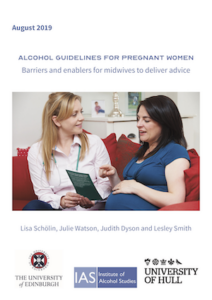View this report

Background
Alcohol exposure during pregnancy can have negative maternal and infant outcomes. Due to a lack of clear evidence of a ‘safe’ threshold for alcohol consumption during pregnancy, the UK Chief Medical Officers (CMOs) revised their guidance in 2016 to advise pregnant women to abstain completely from alcohol.
Furthermore, primary prevention in antenatal care, through screening and brief intervention, has been set as a priority by the World Health Organization (WHO). Midwives are key to achieving these aims, but little is known about the extent to which UK midwives are aware of, and implement, the CMO guidelines. Moreover, there is a lack of knowledge about barriers to implementing the guidelines.
Methods
The aim of this study was to explore knowledge and implementation of the CMO guidelines amongst UK midwives.
A mixed-methods design was used to explore implementation barriers and midwives’ beliefs about addressing alcohol during antenatal care with pregnant women. The study drew on the Theoretical Domains Framework (TDF) and included i) an online survey, and ii) interviews and focus groups with midwives. Midwives were recruited through professional networks and advertisements on social media.
Questionnaire data were analysed using SPSS version 25, summarising midwives’ knowledge and practices regarding implementation of the CMO guidelines and behavioural determinants of advising women to abstain from alcohol. Multivariable logistic regression was used to examine the association between each of the TDF domains and advising all women to abstain at appointments other than booking. The qualitative data were analysed thematically, using Nvivo 12, to gain a deeper understanding of midwives’ practices, views and beliefs about discussing alcohol.
Results
The final survey sample for the quantitative phase was 842 and for the qualitative phase 22. The survey showed that 58% of midwives were aware of the CMO guidelines, of whom 91% reported that alcohol abstinence was advised within the guidelines.
However, a variety of other responses were also given in line with previous national guidelines. The qualitative data showed that midwives may be aware of the recommendations within the CMO guidelines, but less aware of their named source. Furthermore, midwives were supportive of the guidelines and agreed with the underpinning rationale of the ‘precautionary principle’. The incorrect identification of CMO guideline content found by the survey was perceived to be due to midwives commonly referring to NICE guidelines, which until December 2018 included outdated recommendations.
Most midwives (97%) reported ‘always’ or ‘usually’ advising all women to abstain at booking, dropping to 38% at other appointments. Qualitative findings indicated that time pressures and the lack of an established relationship at booking influenced how thoroughly alcohol was covered. Some argued that sensitive topics could be better addressed once a relationship with the woman has been established, but all agreed that clear information on alcohol should be provided on initial contact to enable women to make an informed choice. Few midwives used validated screening tools, many focused on ‘open conversations’ that were non-judgemental to encourage disclosure.
Analysis of the TDF domains from the survey showed that barriers to implementing abstinence advice at appointments other than booking were: women disliking being advised (social influences); not feeling confident (beliefs about capabilities domain); and not feeling the advice will have any impact (beliefs about consequences). Domains that facilitated delivering abstinence advice were: wanting and intending to advise women (goals); seeing it as part of the midwifery role, and that it is expected (professional role and identity). The logistic regression analysis found significantly reduced likelihood of midwives advising abstinence if they disagreed that providing advice was expected of them and was part of their job (OR=0.69, 95% CI: 0.51, 0.95), lacked self-efficacy to inform women about alcohol consumption (OR 0.71, 95% CI: 0.57, 0.88), and emotional factors such as not feeling that it is rewarding to advise women (OR=0.78, 95% CI: 0.67, 0.90). The qualitative findings further emphasised that effective communication skills and knowledge of alcohol-related harm associated with drinking during pregnancy were key to feeling confident in providing advice.
The survey found that 69% of midwives had received fewer than four hours of alcohol training prequalification and 19% had received none. Post-qualification, 33% of midwives had not received any alcohol-related training and only 25% were offered this within annual updates. The qualitative findings showed a perceived lack of training within undergraduate programmes, however midwives believed alcohol might be better covered within current curricula. Most midwives reported ‘usually’ or ‘always’ recording the advice to women and midwives felt that standardised questions can destigmatise the topic.
Conclusions
This study shows that awareness specifically of the CMO guidelines was lacking amongst midwives.
It is worth noting that these guidelines were introduced before a change was made to the National Institute for Health and Care Excellence (NICE) guidelines and for a period of about three years these two guidelines, containing different advice, were available concurrently.
However, the advice that was provided was in line with the CMO guidelines by most midwives during the booking appointment, but not routinely at later appointments. There is no standardised approach to addressing alcohol consumption during antenatal appointments meaning that assessment and recording of alcohol consumption is inconsistent across the UK and within each country. Midwives accept the guidelines in principle and believe that it is important for women to be supported to make informed choices. Use of the TDF helped factors that influenced midwives’ alcohol-related practices.
Findings suggest that interventions aimed to improve midwives’ knowledge, skills and clinical confidence to deliver alcohol advice appropriate for the level of risk of the woman’s drinking may facilitate midwives’ practices.
View this report
